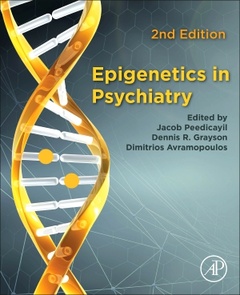Epigenetics in Psychiatry (2nd Ed.)
Coordonnateurs : Peedicayil Jacob, Grayson Dennis R., Avramopoulos Dimitri

Epigenetics in Psychiatry, Second Edition covers all major areas of psychiatry in which extensive epigenetic research has been performed, fully encompassing a diverse and maturing field, including drug addiction, bipolar disorder, epidemiology, cognitive disorders, and the uses of putative epigenetic-based psychotropic drugs. Uniquely, each chapter correlates epigenetics with relevant advances across genomics, transcriptomics, and proteomics. The book acts as a catalyst for further research in this growing area of psychiatry.
This new edition has been fully revised to address recent advances in epigenetic understanding of psychiatric disorders, evoking data consortia (e.g., CommonMind, ATAC-seq), single cell analysis, and epigenome-wide association studies to empower new research. The book also examines epigenetic effects of the microbiome on psychiatric disorders, and the use of neuroimaging in studying the role of epigenetic mechanisms of gene expression. Ongoing advances in epigenetic therapy are explored in-depth.
Part 1: General Aspects of Epigenetics in Psychiatry 1. Introduction to Epigenetics in Psychiatry 2. Outline of Epigenetics 3. A Brief History of Epigenetics in Psychiatry 4. Roles of Epigenetics in the Neural Stem Cell and Neuron 5. Role of Epigenetics in the Brain 6. Epigenetic Epidemiology of Psychiatric Disorders 7. ATAC-seq and Psychiatric Disorders 8. Single Cell RNA Sequencing and Psychiatric Disorders 9. Single Cell Analysis and Psychiatric Disorders 10. Laboratory Techniques in Psychiatric Epigenetics 11. Laboratory Epigenetic Models of Schizophrenia 12. Animal Models of Environmental Manipulations Resulting in Epigenetic Modifications That Increase Risk for Affective Disorders
Part 2: Epigenetics of Psychiatric Disorders 13. 5-Methycytosine and 5-Hydroxymethylcytosine in Schizophrenia 14. Pathogenic Histone Modifications in Schizophrenia are Targets for Therapy 15. Non-Coding RNAs and Psychiatric Disorders 16. Epigenetics of Bipolar Disorder 17. Epigenetics in Major Depressive Disorder 18. The Epigenetics of Suicide: The Critical Impact of Environment on Epigenetic Regulation in Suicide 19. Epigenetics in Posttraumatic Stress Disorder 20. Epigenetics and Cognitive Disorders 21. Epigenetics in Intellectual Disability 22. Epigenetics and Pervasive Developmental Disorders 23. Epigenetics in Child Psychiatry 24. Epigenetic Mechanisms of Drug Addiction Vulnerability 25. Epigenetics and Addiction to Alcohol
Part 3: Epigenetics in the Therapy of Psychiatric Disorders 26. Epigenetic Effects of Currently Used Psychotropic Drugs 27. DNA Methyltransferase Inhibitors and Psychiatric Disorders 28. Histone Deacetylase Inhibitors and Psychiatric Disorders 29. Psychotherapy and Epigenetics in Psychiatry 30. Gene-Specific Editing for Manipulating Specific Psychiatric Disorders
Part 4: Other Topics in Epigenetics in Psychiatry 31. Nutritional Effects on Epigenetics in Psychiatry 32. Systems Biology and the Epigenetics of Psychiatric disorders 33. Transgenerational (Heritable) Epigenetics and Psychiatric Disorders 34. Epigenetic Aspects of the Microbiome and Psychiatric Disorders
Dr Dennis R. Grayson received his PhD from the Department of Biochemistry at Wayne State University School of Medicine in 1984. He has been interested in mechanisms associated with gene expression for over 35 years. He joined the laboratory of Dr James E. Darnell at the Rockefeller University as a Post-Doctoral Fellow in 1984 to study cell-type specific transcription factors and their interaction with promoters and enhancers. In 1988, Dr Grayson joined the Fidia-Georgetown Institute for the Neurosciences at Georgetown University to study gene expression programs in neurons and continued this research program at Allegheny Singer Research Institute
in Pittsburgh from 1995 to 1998. He continued his interests in psychiatry and joined the Psychiatric Institute at the University of Illinois in 1998. This represented a unique opportunity to pursue the molecular underpinnings of schizophrenia. Dr Grayson has received NRSA post-doctoral support, and R01 and K04 funding from the National Institutes of Health to support his work. He has published over 140 papers in peer-reviewed journals and is regularly invited to speak at numerous national and international meetings. He is currently Director of the Epigenetic Core of the Center for Alcohol Research in Epigenetics.
Dr
- Fully revised to discuss new areas of research across neuronal stem cells, cognitive disorders, and transgenerational epigenetics in psychiatric disease
- Relates broad advances in psychiatric epigenetics to a modern understanding of the genome, transcriptome, and proteins
- Catalyzes knowledge discovery in both basic epigenetic biology and epigenetic targets for drug discovery
- Provides guidance in research methods and protocols, as well how to employ data from consortia, single cell analysis, and epigenome-wide association studies (EWAS)
- Features chapter contributions from international leaders in the field
Date de parution : 08-2021
Ouvrage de 846 p.
19x23.4 cm
Thèmes d’Epigenetics in Psychiatry :
Mots-clés :
ATAC-seq; Acetylation; Acute/chronic drug exposure; Addiction vulnerability; Aging; Alcohol use disorder; Alzheimer’s disease; Animal models; Antidepressants; Antipsychotics; Anxiety; Artificial neurogenesis; Attention deficit hyperactivity disorder; Attention-deficit; Autism; Autism spectrum disorder; Base excision repair; Bioinformatics; Biomarker; Biomarkers; Bipolar; Bipolar depression; Bipolar disorder; Brain; CRISPR; Causal inference; Cell cycle; Cell fate determination; Chromatin; Chromatin accessibility; Chromatin immunoprecipitation; Chromatin remodeling; Clinical trials; Cognition; Cognitive decline; Copy number variation; Cortical neurons; Cross-sensitization; DNA methylation; DNA methylation and histone acetylation; DNA methyltransferase; DNA methyltransferases; De novo mutations; Deacetylation; Demethylation; Depression; Development; Diet; Differentiation; Drug abuse; Dynamics; Early-life adversity; Environment; Epidemiology; Epigenetic; Epigenetic inheritance; Epigenetic plasticity; Epigenetic therapeutics; Epigenetic therapy; Epigenetics; Epigenome; Epigenomics; FKBP5; Fragile X syndrome; G9a; Gamma aminobutyric acid; Genetic screen; Genetics; Genome landscape; Genome-wide DNA methylation; Genome-wide studies; Genomics; Glucocorticoid receptor; HDAC; HDACi; HDACs; HPA axis; Heritability; Hippocampal neurons; Histone; Histone PTMs; Histone acetylation; Histone deacetylase; Histone deacetylase inhibitors; Histone methylation; Histone modifications; Histone posttranslational modifications; Histones; History; Human induced pluripotent stem cells; Huntington’s disease; Hydroxymethylation; Hyperactivity disorder; Hypothalamic-pituitary-adrenal axis; Imprinting; Imprinting disorders; Infection; Intellectual disability; L-Methionine; Laboratory



